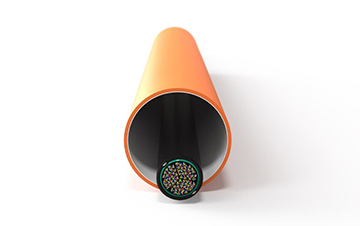
Artist view of Corning next-gen cable in conduit. [Image: Corning Inc.]
Lumen Technologies, a network and cloud services firm based in Denver, CO, USA, announced that it had inked a “substantial” agreement with Corning Inc., the multinational materials technology company based in Corning, NY, USA, to supply Lumen’s near-term needs for advanced optical-fiber cable.
Under the terms of the deal, Corning will set aside 10% of its global fiber capacity “for each of the next two years” to meet the burgeoning needs of Lumen’s data-center clients. According to Corning, the work under the agreement would mark “the first outside-plant deployment” of its new generation of fiber-packed cable, and would more than double Lumen’s current intercity fiber miles in the United States.
AI, once again
As with so many business announcements of late, the Lumen–Corning reveal comes seasoned with more than a dollop of artificial intelligence. The stated reason for the new fiber set-aside, and for Lumen’s infrastructure plans, is to offer “significant capacity to major cloud data centers racing to stay ahead of AI workloads and high bandwidth applications fueled by massive amounts of data.” The two companies cited in particular the vast data appetite of generative AI, which puts a premium on both the number of fiber connections and the robustness of the fiber network.
As with so many business announcements of late, the Lumen–Corning reveal comes seasoned with more than a dollop of artificial intelligence.
The supply agreement with Corning comes on the heels of another Lumen announcement in late July, in which the network provider announced a “new strategic partnership” with the software and cloud giant Microsoft Corp. As part of that arrangement, Microsoft will reportedly draw on Lumen’s “Private Connectivity Fabric” (PCF), a modular custom-network package that combines access to the firm’s existing fiber networks with the installation of new fiber and a layer of digital services atop the physical network. Lumen describes the PCF, which is aimed particularly at hyperscalers and cloud providers with significant data scaling requirements, as “AI-ready infrastructure.”
Multi-conduit system
Lumen claims to have North America’s “largest ultra-low-loss intercity fiber network,” with routes involving more than 50 US cities. One thing the company notes as a distinguishing plus for Lumen is its multi-conduit system for its fiber networks, which Lumen says allows it to deploy new fiber technology quickly.

[Image: Courtesy of Lumen Technologies and Corning Inc.]
That capability seems important to the announced arrangement with Corning, which Lumen says represents its largest-ever cable purchase. In a joint press release announcing the supply agreement, Corning chairman and CEO Wendell P. Weeks said that the deployment of his firm’s “new gen-AI fiber and cable system” would “enable Lumen to fit anywhere from two to four times the amount of fiber into their existing conduit.” Lumen president and CEO Kate Johnson added that the Corning agreement “gives Lumen status as a preferred partner and secures a significant supply of next-generation fiber today and in the future.”
Eyeing a turnaround
Investors clearly liked the sound of Lumen’s recent announcements. Between 24 July, when the Microsoft partnership was revealed, and 1 August, the date of the release on the Corning arrangement, Lumen’s stock price more than doubled, reaching US$3.32 per share. It has since given back some of those gains, and is trading at US$2.73 per share as this story is being written—possibly a reflection of some of the macroeconomic concerns that have bedeviled other parts of the equity markets as well.
Over the longer term, Lumen still has far to go as it works to execute a turnaround by adding enterprise customers, upgrading its infrastructure to support high-growth areas, adding digital services and rationalizing costs. In a significant milestone on the journey, the company last March successfully extended most of the maturities on most of its more than US$15 billion in debt to 2029 or beyond. The firm says the maturity extension, coupled with some US$1.3 billion in new debt financing, will “give the company more runway for our turnaround.”
